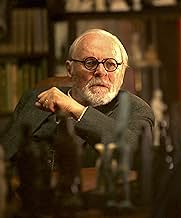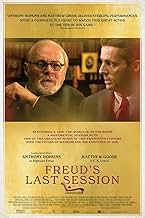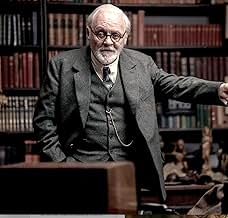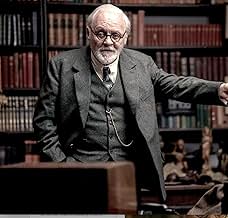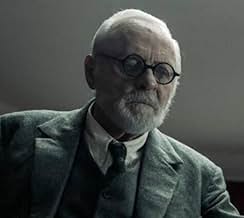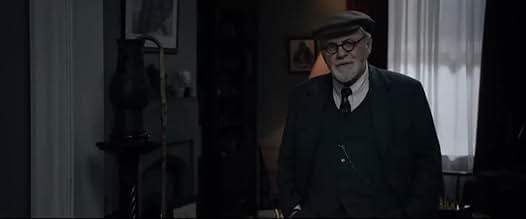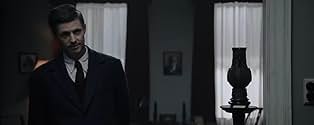Ajouter une intrigue dans votre languePsychoanalyst Sigmund Freud invites professor C.S. Lewis to debate the existence of God, Freud's unique relationship with his daughter, and Lewis' unconventional relationship with his best f... Tout lirePsychoanalyst Sigmund Freud invites professor C.S. Lewis to debate the existence of God, Freud's unique relationship with his daughter, and Lewis' unconventional relationship with his best friend's mother.Psychoanalyst Sigmund Freud invites professor C.S. Lewis to debate the existence of God, Freud's unique relationship with his daughter, and Lewis' unconventional relationship with his best friend's mother.
- Prix
- 1 nomination au total
- Paddy Moore
- (as a different name)
- Ilsa
- (as Anna Blomeyer)
Avis en vedette
And that's what the movie is, two men talking, interrupted occasionally by flashbacks to their younger days and air raid to lend this stage play some cinematic credibility. In this made-up scenario -- although the story is that an Oxford don visited Freud shortly before his death, the claim, as here, that it was Lewis, is a fabrication of the play and movie -- they argue around each other, and finally agree only that people are afraid of death.
The rest of it.... well, Freud's beliefs are at the end of his life (he died three weeks after the supposed events of this film), while there are plenty of things that Lewis did say until twenty years after. As for the basic disagreement about religion versus science, that's a non-conflict; as smarter people than I have declared, science is about how, not why. If G*d created the universe we live in, thanks a lot.
Both men are fine actors and easily translate the script into natural-sounding words. I have no idea if Hopkins' accent is a good representation of the Viennese one; Kohli Calhoun is listed as the dialect coach.
Freud's Last Session is part of a cottage movie genre, almost always taken from a Broadway play, where two-man shows are relatively common. The author puts two historical figures together in a room and lets them debate various important issues for close to two hours. Nixon/Frost is the one I remember offhand, but there have been others as well. In the theater - a small theater - I can see this working well. I'm not sure how it works as a movie, or more to the point: for whom it works. Movies, even modest ones like this, cost a LOT more to produce than plays. Can something like this recoup the investment?
Yes, the two actors give very fine performances. People go to see Shakespeare plays not to see what will happen to Hamlet or Romeo and Juliet. They already know before they enter the theater. They go to see how the actors will deliver the lines.
But here, unlike in Shakespeare, the lines are not particularly striking. Hopkins in particular did a great job of creating the character Freud, but he didn't have Shakespeare's words - or even, say, those of the playwright who wrote The Lion in Winter - to work with.
So I'm left with my initial question: how many people are going to pay to see Hopkins and Goode deliver their uninspired lines? And will that make enough ticket sales to at least break even on this movie?
I enjoyed it, yes, but I found that it was too much of the same thing for too long, and would have been happier if it had been shorter.
For a very basic overview, Freud's Last Session imagines a fictional encounter-which may or may not have actually occurred-between the titular psychoanalyst (Anthony Hopkins) and Christian apologist C. S. Lewis (Matthew Goode). As the two trade philosophical worldviews in Freud's home, the doctor's daughter Anna (Liv Lisa Fries) struggles with her own relationship with her famous father alongside a closeted relationship with colleague Dorothy Burlingham (Jodi Balfour).
I'm not entirely sure if Freud's Last Session has ever been produced as a stage play, but if so that might actually be the better format for it. With the core of the film being an intellectual sparring match between two academics, it's a bit of an odd fit for a big-screen format or presentation. Brown tries to flesh things out with the Freud daughter plotline and various flashbacks, but those avenues feel a bit forced and ultimately serve to take the focus off the "main event".
Fortunately, the movie has two things squarely in its corner: First, the back-and-forth repartee truly does raise some food for thought (if treading somewhat familiar religion vs atheism ground). A few lines really stuck with me. Secondly, Hopkins continues to provide transformative performances. Fans of his won't regret the admission just based on his turn alone here.
Overall, I settled on 7/10 stars for Freud's Last Session. Technically it isn't even "that good" of a flick, but the Hopkins performance and general setup are enough that those even nominally interested in the premise can find enough to enjoy.
My faith was also shaken early in the movie when, for no discernible reason, the order of two famous events was reversed. On September 3, 1939, Prime Minister Chamberlain announced over the radio that the nation was at war with Germany. A few minutes later, air raid sirens went off, terrifying London's populace. (It proved to be a false alarm.) For some reason, the movie has the false air raid preceding the declaration of war.
It also features, in connection with Chamberlain's broadcast, an old bête noire of mine: A large group of psychologists is listening to his historic speech on the radio, and when it's over, the BBC announcer says something like "That ends the Prime Minister's message" -- at which point someone (is it Anna Freud?) snaps off the radio. No one would do that in real life, with war just declared and with urgent government announcements yet to follow (and there were plenty of them).
One further complaint: the clumsy way flashbacks are shoehorned into the narrative, giving us the backstories of Freud, Lewis, and Anna, with a heavy emphasis on Anna's lesbianism.
Incidentally, considering that C. S. Lewis was one of the most brilliant speakers in Britain -- eloquent, persuasive, never at a loss for words -- he is uncharacteristically tight-lipped, timid, and hesitant in this movie, even for someone being courteous to a revered, dying old man. Armand Nicholi's fanciful book "The Question of God," one of the inspirations for this movie, lets the two iconic figures battle it out, with Lewis (and God) ultimately gaining the upper hand. But in this movie's version of that imaginary encounter, Lewis has little to say. It is all Freud's show.
At least the movie is handsomely mounted; it's nice to see what Freud's office must have looked like. That aside, I can't see the point of the movie. Is it just to give Hopkins the chance to do another bad impersonation of a historical figure?
Le saviez-vous
- AnecdotesAnthony Hopkins had previously portrayed C.S. Lewis in L'univers des ombres (1993) 30 years prior to this film.
- GaffesLewis refers to JRR Tolkien as "John". He was known as "Ronald" to his friends.
- Citations
J.R.R. Tolkien: Jack, when you read myths about gods that come to Earth and sacrifice themselves, their stories move you, so long as you read it anywhere but the Bible.
- ConnexionsFeatured in The 7PM Project: Episode dated 19 April 2024 (2024)
- Bandes originalesVariations on an Original Theme, Op. 36, 'Enigma' Variation 9: Nimrod
Composed by Edward Elgar
Performed by Symfonický orchester Slovenského rozhlasu (as Slovak Radio Symphony Orchestra) & Adrian Leaper (Conductor)
Licensed courtesy of Naxos Music UK Ltd
Meilleurs choix
- How long is Freud's Last Session?Propulsé par Alexa
Détails
- Date de sortie
- Pays d’origine
- Langues
- Aussi connu sous le nom de
- La Última Sesión de Freud
- Lieux de tournage
- sociétés de production
- Consultez plus de crédits d'entreprise sur IMDbPro
Box-office
- Brut – États-Unis et Canada
- 906 283 $ US
- Fin de semaine d'ouverture – États-Unis et Canada
- 45 590 $ US
- 24 déc. 2023
- Brut – à l'échelle mondiale
- 4 190 596 $ US
- Durée1 heure 50 minutes
- Couleur
Contribuer à cette page







